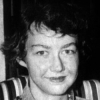Flannery O'Connor

Flannery O'Connor
Mary Flannery O'Connorwas an American writer and essayist. An important voice in American literature, she wrote two novels and 32 short stories, as well as a number of reviews and commentaries. She was a Southern writer who often wrote in a Southern Gothic style and relied heavily on regional settings and grotesque characters. Her writing also reflected her own Roman Catholic faith and frequently examined questions of morality and ethics. Her posthumously-compiled Complete Stories won the 1972 U.S. National Book...
NationalityAmerican
ProfessionNovelist
Date of Birth25 March 1925
CitySavannah, GA
CountryUnited States of America
He had the feeling that everything he saw was a broken-off piece of some giant blank thing that he had forgotten had happened to him.
A gift of any kind is a considerable responsibility. It is a mystery in itself, something gratuitous and wholly undeserved, something whose real uses will probably always be hidden from us.
When you leave a man alone with his Bible and the Holy Ghost inspires him, he's going to be a Catholic one way or another, even though he knows nothing about the visible church. His kind of Christianity may not be socially desirable, but will be real in the sight of God.
I preach there are all kinds of truth, your truth and somebody else's. But behind all of them there is only one truth and that is that there's no truth.
Everywhere I go, I'm asked if I think the universities stifle writers. My opinion is that they don't stifle enough of them. There's many a best seller that could have been prevented by a good teacher.
To expect too much is to have a sentimental view of life and this is a softness that ends in bitterness.
I write because I don't know what I think until I read what I say.
[Simone Weil's] life is almost a perfect blend of the Comic and the Terrible, which two things may be opposite sides of the same coin. In my own experience, everything funny I have written is more terrible than it is funny, or only funny because it is terrible, or only terrible because it is funny.
In the greatest fiction, the writer's moral sense coincides with his dramatic sense, and I see no way for it to do this unless his moral judgement is part of the very act of seeing, and he is free to use it. I have heard it said that belief in Christian dogma is a hindrance to the writer, but I myself have found nothing further from the truth. Actually, it frees the storyteller to observe. It is not a set of rules which fixes what he sees in the world. It affects his writing primarily by guaranteeing his respect for mystery...
...the only thing that makes the Church endurable is that it is somehow the body of Christ and that on this we are fed. It seems to be a fact that you have to suffer as much from the Church as for it but if you believe in the divinity of Christ, you have to cherish the world at the same time that you struggle to endure it.
The operation of the Church is entirely set up for the sinner; which creates much misunderstanding among the smug.” (August 9, 1955)
Her name was Maude and she drank whisky all day from a fruit jar under the counter.
Satisfy your demand for reason but always remember that charity is beyond reason, and God can be known through charity.
Accepting oneself does not preclude an attempt to become better.